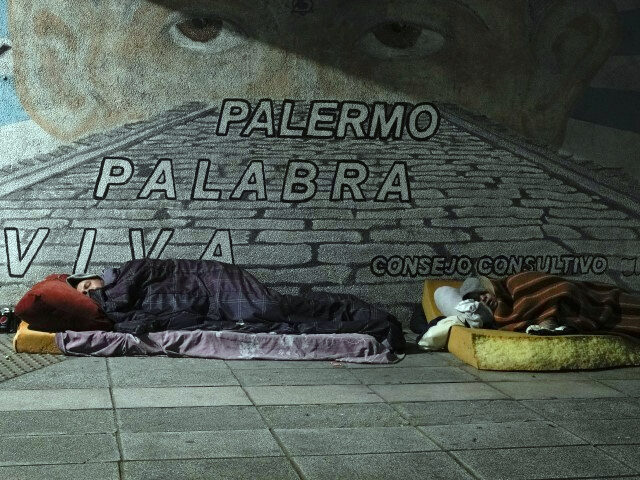The Catholic University of Argentina found the poverty rate in the country to be at 57.4 percent in January, the highest rate recorded in 20 years, the financial newspaper Ámbito recently reported.
The study’s projections indicated a population of 27 million poor Argentines, of which 7 million would be classified as indigent.
The study, first published by the Argentine newspaper, found that poverty rates dramatically jumped from 49.5 in December to 57.4 in January mainly as a result of Argentina’s inflation rate and the devaluation of the Argentine peso and the subsequent spike in prices of basic items, including food, services, and other non-food goods.
The government of President Javier Milei, as part of its broad “shock therapy” plan to repair Argentina’s economy after almost two decades of socialist rule, carried out a dramatic devaluation of the peso in December to bring its official exchange value closer to that of the street market rates.
Before Milei’s inauguration, Argentina maintained an extremely convoluted multi-tier currency control and exchange system, with different and sometimes highly specific exchange rates that kept the peso artificially strong. The system led to a wide gap between “official” rates and parallel rates that existed out of the exchange control system.
“In order to ponder the worsening of the social situation, two simulation exercises were carried out: The first recalculates the level of indigence and poverty in the situation of increase of baskets and updating of labor and non-labor income of December 2023,” the study explained. “The second exercise reproduces the situation of basket costs and labor and non-labor income of households in January 2024.”
Milei reacted to the study over the weekend on social media, condemning the situation as the legacy of the “caste model” — a term he has often used to describe elitist socialist government run by a small “high caste.”
“The true legacy of the caste model: 6 out of 10 Argentines are poor. The destruction of the last hundred years has no parallel in the history of the West,” Milei’s message read. “Politicians have to understand that people voted for a change and that we are going to give our lives to carry it out.”
“We did not come to play the mediocre game of politics. We came to change the country,” he continued, concluding with his now widely famous catchphrase, “Long live liberty, damn it!”
La verdadera herencia del modelo de la casta: 6 de cada 10 argentinos son pobres. La destrucción de los últimos cien años no tiene paragón en la historia de Occidente.
Los políticos tienen que entender que la gente votó un cambio y que nosotros vamos a dar la vida para llevarlo… https://t.co/pdoAEZqBjN
— Javier Milei (@JMilei) February 18, 2024
While the study found a dramatic surge in poverty rates in January, Milei and Argentine Economy Minister Luis Caputo’s austerity measures led to the South American nation’s first monthly surplus in 12 years that month, marking the first time since August 2012 that Argentina spent less than what it generated.
Milei previously stated to local media that, as a result of Argentina’s precarious economy, the nation will have to go through the “hardest” moment of its economy between March and April. After that, Milei predicted a “rebound” as a result of his policies.
“You’re going to do a sort of ‘V’, a first stretch falling, with the hardest moment around March-April, which is when you hit bottom and there you start to bounce back, and when you lift the [currency exchange control restrictions], the economy shoots forward,” Milei explained during an interview with the local Radio Rivadavia last week.
One of Milei’s main economic goals is the “dollarization” of Argentina, which means replacing the ailing Argentine peso with the U.S. dollar as legal tender – similar to how other countries in the region have done in the past to great success, such as El Salvador and Ecuador.
Economy Minister Luis Caputo explained on Wednesday evening that dollarization is the goal and will occur once the conditions are “optimal,” adding that further devaluation “is not in our plans.”
“In the last quarter of this year we are going to start to see a recovery,” Caputo said. “The sooner we lower inflation, the faster that rebound will be. To bring inflation down we have to be as disciplined as possible.
“The president always said it was going to be hard; if one could get out of so many decades of disaster in two months, it would be easy,” he continued. “We are doing the impossible so that this transition is the least burdensome; the alternative was hyperinflation.”
The National Institute of Statistics and Census of Argentina measured January’s inflation rate at 20.6 percent, down from December’s 25.5 percent, for an accumulated total of 254.2 percent over the past year.
Christian K. Caruzo is a Venezuelan writer and documents life under socialism. You can follow him on Twitter here.

COMMENTS
Please let us know if you're having issues with commenting.